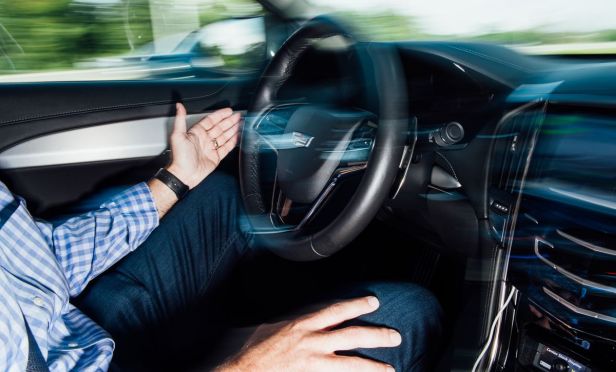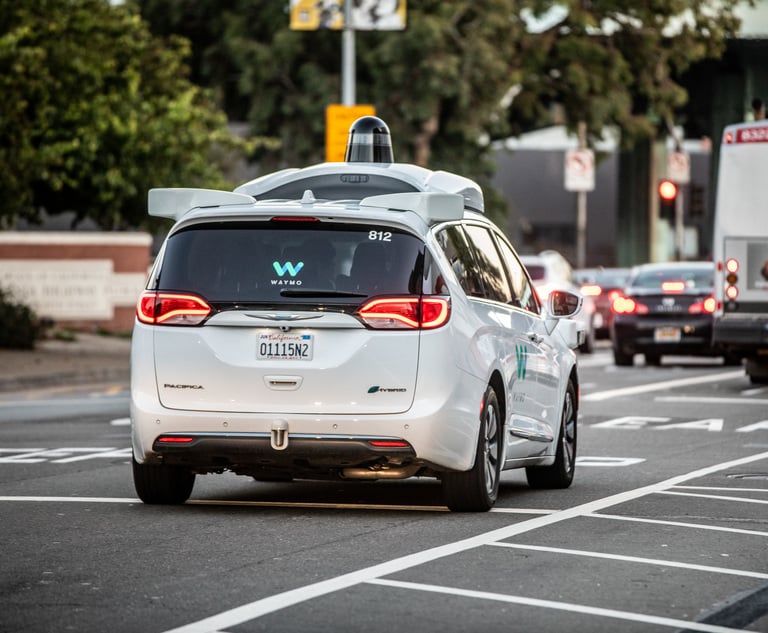 A Magna International Inc. representative leads a demonstration of a semi-autonomous vehicle in Holly, Michigan. (Photo: Graham Walzer/Bloomberg)
A Magna International Inc. representative leads a demonstration of a semi-autonomous vehicle in Holly, Michigan. (Photo: Graham Walzer/Bloomberg)
Seven in 10 Americans don't want to go anywhere near self-driving cars.
The portion of Americans who fear autonomous vehicles — 71% in the American Automobile Association's latest survey — is virtually unchanged from a year ago and up eight percentage points from 2017. While public skepticism isn't new, its consistency is noteworthy. Last year's survey, in which 73% expressed anxiety about self-driving cars, came out just nine weeks after an autonomous test vehicle operated by Uber Technologies Inc. killed a pedestrian in Tempe, Arizona.
There's been virtually no increase in public acceptance even as automakers and tech giants are pouring billions into driverless technology. Honda Motor Co. and Japan's Softbank Vision Fund invested a combined $5 billion into General Motor Co.'s Cruise autonomous-driving unit last year, and Volkswagen AG is in talks about investing in Ford Motor Co.'s Argo AI, with the two said to be discussing a $4 billion valuation.
AAA's studies suggest public opinion could be a steep challenge when it comes time to convince customers to pay for the transportation of the future.
Sustained level of fear may be rooted in heightened focus
“It's possible that the sustained level of fear is rooted in a heightened focus, whether good or bad, on incidents involving these types of vehicles,” Greg Brannon, AAA's director of automotive engineering, said in a statement. “Also it could simply be due to a fear of the unknown.”
Unlike in years past, the latest AAA survey lands at a moment when self-driving businesses are starting to engage with the public. Waymo, the self-driving startup launched inside Google, began offering a robo-taxi service to hundreds of customers in suburban Phoenix in December. GM plans its own driverless ride-hailing service in a U.S. city later this year. Meanwhile, driverless test cars are logging millions of miles on public roads in states including California, Arizona, Florida, Pennsylvania and Michigan.
The creators of self-driving technology have acknowledged their trust problem. In January, Waymo joined with Cruise Automation and 22 other organizations to form a coalition aimed at easing consumer concerns about autonomy. The Partnership for Automated Vehicle Education (PAVE) has said it will conduct self-driving test rides for consumers and policymakers, as well as conduct educational workshops and develop informational materials for lawmakers, consumers and educators.
Putting kids into self-driving cars? Only 19% would do that.
Deadly crashes are far from the norm. In fact, the cautious characteristics of autonomous driving have resulted in a series of minor collisions, often involving impatient humans unaccustomed to the rigid rule-following of robots.
Familiarity appears to be key to easing anxiety. The AAA survey of 1,008 Americans found that drivers of cars with lane-keeping software, automatic emergency braking and other forms of automated driver assistance are far more comfortable with these features. Use of driver-assist technology make drivers 68% more likely to trust semi-autonomous cars, the study found.
The survey also gauged public reaction to more limited uses of autonomous vehicles. Just more than half of U.S. drivers — 53% — said they would be comfortable using fully self-driving vehicles as low-speed people-mover systems at airports or theme parks, free from the chaotic traffic of the open road. Even fewer Americans — 44% — said they would be comfortable with autonomous delivery vehicles that haul food or packages, not passengers.
Baby steps
These limited deployments might also help ease the public into acceptance. ”Americans are willing to take baby steps toward incorporating this type of technology into their lives,” Brannon said. “Hands-on exposure in more controlled, low-risk environments coupled with stronger education will play a key role in easing fears.”
Putting children or family members into a fully self-driving car? Only 19% of those surveyed would be comfortable with that.
All the general wariness still isn't translating into doubt that the self-driving future may be inevitable. More than half of those surveyed — 55% — believe that by 2029, most cars will have the ability to drive themselves.
Related:
This content has been archived. It is available through our partners, LexisNexis® and Bloomberg Law.
To view this content, please continue to their sites.
Not a Lexis Subscriber?
Subscribe Now
Not a Bloomberg Law Subscriber?
Subscribe Now
NOT FOR REPRINT
© 2025 ALM Global, LLC, All Rights Reserved. Request academic re-use from www.copyright.com. All other uses, submit a request to [email protected]. For more information visit Asset & Logo Licensing.
You Might Like
View All

Shareholder Democracy? The Chatter Musk’s Tesla Pay Case Is Spurring Between Lawyers and Clients
6 minute read
Willkie Farr & Gallagher Drives Legal Challenge for Uber Against State's Rideshare Laws
5 minute read
Trending Stories
Who Got The Work
J. Brugh Lower of Gibbons has entered an appearance for industrial equipment supplier Devco Corporation in a pending trademark infringement lawsuit. The suit, accusing the defendant of selling knock-off Graco products, was filed Dec. 18 in New Jersey District Court by Rivkin Radler on behalf of Graco Inc. and Graco Minnesota. The case, assigned to U.S. District Judge Zahid N. Quraishi, is 3:24-cv-11294, Graco Inc. et al v. Devco Corporation.
Who Got The Work
Rebecca Maller-Stein and Kent A. Yalowitz of Arnold & Porter Kaye Scholer have entered their appearances for Hanaco Venture Capital and its executives, Lior Prosor and David Frankel, in a pending securities lawsuit. The action, filed on Dec. 24 in New York Southern District Court by Zell, Aron & Co. on behalf of Goldeneye Advisors, accuses the defendants of negligently and fraudulently managing the plaintiff's $1 million investment. The case, assigned to U.S. District Judge Vernon S. Broderick, is 1:24-cv-09918, Goldeneye Advisors, LLC v. Hanaco Venture Capital, Ltd. et al.
Who Got The Work
Attorneys from A&O Shearman has stepped in as defense counsel for Toronto-Dominion Bank and other defendants in a pending securities class action. The suit, filed Dec. 11 in New York Southern District Court by Bleichmar Fonti & Auld, accuses the defendants of concealing the bank's 'pervasive' deficiencies in regards to its compliance with the Bank Secrecy Act and the quality of its anti-money laundering controls. The case, assigned to U.S. District Judge Arun Subramanian, is 1:24-cv-09445, Gonzalez v. The Toronto-Dominion Bank et al.
Who Got The Work
Crown Castle International, a Pennsylvania company providing shared communications infrastructure, has turned to Luke D. Wolf of Gordon Rees Scully Mansukhani to fend off a pending breach-of-contract lawsuit. The court action, filed Nov. 25 in Michigan Eastern District Court by Hooper Hathaway PC on behalf of The Town Residences LLC, accuses Crown Castle of failing to transfer approximately $30,000 in utility payments from T-Mobile in breach of a roof-top lease and assignment agreement. The case, assigned to U.S. District Judge Susan K. Declercq, is 2:24-cv-13131, The Town Residences LLC v. T-Mobile US, Inc. et al.
Who Got The Work
Wilfred P. Coronato and Daniel M. Schwartz of McCarter & English have stepped in as defense counsel to Electrolux Home Products Inc. in a pending product liability lawsuit. The court action, filed Nov. 26 in New York Eastern District Court by Poulos Lopiccolo PC and Nagel Rice LLP on behalf of David Stern, alleges that the defendant's refrigerators’ drawers and shelving repeatedly break and fall apart within months after purchase. The case, assigned to U.S. District Judge Joan M. Azrack, is 2:24-cv-08204, Stern v. Electrolux Home Products, Inc.
Featured Firms
Law Offices of Gary Martin Hays & Associates, P.C.
(470) 294-1674
Law Offices of Mark E. Salomone
(857) 444-6468
Smith & Hassler
(713) 739-1250






